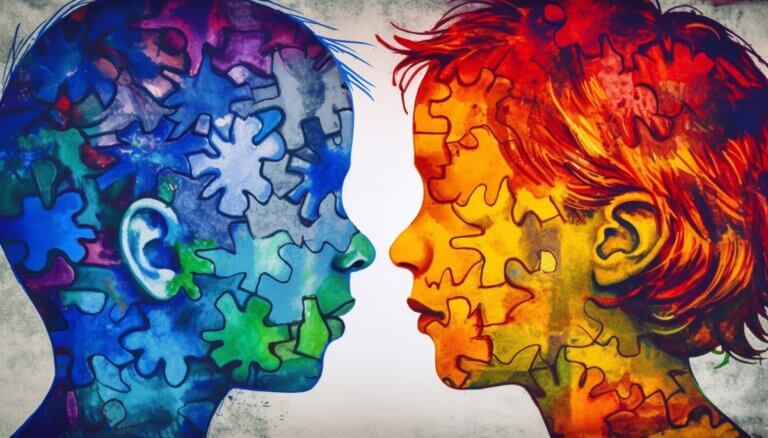Table of Contents
Emotional Intelligence in Agile Management

Self-awareness and Self-regulation
Emotional intelligence in agile management is crucial because Agile leadership requires not only flexibility and adaptability in dealing with methods and teams, but also a high degree of self-awareness and control over one’s own emotions.
The Pillars of Self-Awareness
The ability to self-perceive is the foundation of emotionally intelligent leadership. It enables leaders to recognize their own emotions and understand how these affect their behavior. Agile methods demand constant reflection and adjustment, not only of processes but also of personal leadership styles. Here is a practical example: An agile team is nearing a deadline, the pressure mounts. A leader who recognizes their stress signals can consciously counteract, maintain calm, and defuse conflicts in the team before they escalate.
- Through honest feedback and continuous self-reflection, leaders can sharpen their self-awareness.
- Techniques such as mindfulness training help to develop emotional self-awareness.
- Reflections on one’s own behavior recorded in journals enhance self-knowledge.
Self-Regulation in Action
Self-regulation is the ability to manage and redirect one’s emotional responses appropriately. Agility and emotional intelligence are closely linked in business, as in the agile world, change is the only constant. Emotionally intelligent leaders use their self-regulation skills to proactively respond to changes rather than acting impulsively.
- Self-regulation allows for maintaining composure in heated debates and presenting constructive solutions.
- Leaders employ techniques such as deep breathing or short breaks to keep a cool head during hectic moments.
- Long-term strategies, such as regular self-reflection, promote the ability to make value-based decisions even under pressure.
Agile leadership means more than just establishing flexible strategies and processes – it also demands a deep understanding of the role that emotional intelligence plays in leadership and collaboration. The practice of self-perception and self-regulation is an indispensable tool not only for leading projects to success but also for creating a resilient and motivated team capable of meeting the challenges of agile work environments.
Empathy and Social Competence
Empathy and social competence are at the core of emotional intelligence and are crucial for the successful implementation of agile leadership. These skills enable leaders to develop a deep understanding of the perspectives of their team members, which in turn is essential for the effectiveness of agile methods.
The Fundamentals of Empathy in Agile Management
Empathy in leadership means putting oneself in the employees’ shoes, recognizing and considering their feelings and viewpoints. This ability leads to emotionally intelligent leadership and lays the foundation for smooth operations in agile processes. Agile leaders are capable of reading the emotional climate of their team and acting accordingly, for example by adjusting project requirements when they recognize stress or overload among team members.
- By conducting individual conversations with the team and addressing personal as well as professional concerns, a leader can build trust and promote well-being.
- In meetings, active empathy serves to give all team members a sense of importance, which boosts their engagement and satisfaction.
- In conflict resolution, an empathetic understanding helps to identify the real reasons for differences and to find solutions that are fair to everyone.
Social Skills in Agile Collaboration
Social skills are required for smooth teamwork, especially in the dynamic environment brought about by agile methods. These are characterized by effective communication, the ability to collaborate and resolve conflicts, as well as by a strong sense of community. A team that operates on these foundations can quickly respond to changes, thus strengthening agility and emotional intelligence in agile management.
- During a project, regular stand-ups where team members keep each other up to date promote open communication.
- Pair programming, a collaborative approach to software development, demonstrates the importance of teamwork and the direct exchange of knowledge.
- Retrospectives, which take place after each sprint, provide a platform for feedback and continuous improvement and underscore the necessity of social skills in practice.
By cultivating empathy and strengthening social skills, a leader is not only able to recognize and consider individual needs but also promotes the entire team in its development and collaboration. Emotional intelligence in agile management is thus one of the keys to sustainable success in the modern working world.
Implementing Emotional Intelligence in Agile Practice

Implementing Emotional Intelligence in Agile Practice
Agile leadership and the integration of emotional intelligence in agile management are crucial for the thriving of organizations in the modern work environment. Emotional intelligence allows leaders and employees to not only provide constructive feedback but also to receive it, creating a positive feedback culture and contributing to continuous growth.
- Emotional intelligence is the foundation upon which agile leadership is built. It allows the nuances in the social fabric of a team to be recognized and authentically responded to.
- Agile methods greatly benefit from an emotionally intelligent approach, as rapid iterations and feedback loops heavily demand the interpersonal skills of team members.
- Emotionally intelligent leadership also means communicating difficult feedback in a way that is motivating and developmental rather than demotivating.
The Role of Emotional Intelligence in Feedback Culture
Emotional intelligence in agile management directly influences the manner in which feedback is given and received. Agile leaders who display high emotional intelligence are able to provide their team members with feedback that not only aims at improving performance but also considers individual emotions and personal growth.
A practical example would be a situation where an employee delivers suboptimal results in a project. An emotionally intelligent leader would not only address this factually but also empathetically inquire into what factors might have led to this performance and collaboratively look for solutions.
The Impact on Agility and Emotional Intelligence
Agility and emotional intelligence are closely intertwined. The agile world demands that leaders quickly adapt to changing circumstances while considering the human element.
A real-life example shows how an agile-led company remains successful in times of unexpected market changes: A leader who acts with emotional intelligence will be able to recognize the fears and concerns of team members, address them, and take them along on a common path of change.
By combining Agile methods and emotional intelligence, a dynamic is created that not only makes organizations more adaptable but also fosters a deeper human connection, contributing to performance enhancement and satisfaction at the workplace. In considering these human aspects lies the true value of emotionally intelligent leadership within agile management practices.
Decision Making and Emotional Intelligence
Emotional intelligence in agile management is a crucial factor for making efficient and sustainable decisions. Agile leadership means being flexible in responding to changes while keeping the well-being of the team in mind. The ability to use and understand emotions intentionally plays a significant role in this. Emotionally intelligent leadership fosters a corporate culture that supports innovation and creativity, and enables leaders to quickly adapt to new challenges.
Emotional Intelligence and Decision Making
The cornerstones of emotional intelligence are self-awareness, self-regulation, social competence, empathy, and motivation. These components contribute significantly to agile decision-making. A leader who understands their own emotions and those of their employees can act more consciously and positively influence the team atmosphere. In decision-making, in addition to analyses and data, intuition and human values also play a big role. Agile methods emphasize the importance of iterative learning and feedback, meaning that emotional feedback must be seen as valuable information.
- Example: In a project meeting, a team member expresses concerns about a proposed plan. An emotionally intelligent leader recognizes the emotions behind it and uses the opportunity to probe deeper and actively listen to uncover the actual reasons. This may lead to a better solution and strengthen the team’s bond.
- Practical case: In a software development project, various technical solutions are available for selection. The use of emotional intelligence assists in evaluating not only technical aspects but also the impact on the team and future projects.
- Research context: Studies show that teams with emotionally intelligent leaders exhibit higher satisfaction and performance, as their decisions strengthen the team structure and the individual employees.
Agility and Emotional Intelligence in Everyday Leadership
In the agile world, changes and adjustments are the order of the day. Decisions often need to be made quickly. Here, emotional intelligence helps in finding the right balance between rationality and emotional relevance. By capturing team dynamics and incorporating emotional signals, decisions can be made that lead to long-term success and promote agile working.
Emotional intelligence in agile processes requires constant self-reflection and a willingness for lifelong learning. Only in this way can leaders create an atmosphere in which employees feel valued and thus are motivated to give their best. Integrating emotional intelligence into agile management enriches the agile methodology and supports the development of an adaptive and resilient organization.
Summary
Emotional intelligence and agile management form a crucial duo in today’s dynamic business world. Agile leadership requires a deep understanding of one’s own emotions and those of others to act flexibly and effectively. Emotional intelligent leaders are able to recognize and manage their feelings, which is particularly valuable in an agile environment.
Agility and Emotional Intelligence in the Business Context
The ability for self-awareness is an important step towards Emotional Intelligence in Agile Management. It helps leaders react appropriately to stressful situations by maintaining calm in heated discussions and avoiding escalations.
- Being open to feedback and regular self-reflection are essential to improve self-awareness.
- Mindfulness training can help control emotional responses during stressful phases.
- Individual reflections, for example in journals, promote self-knowledge.
Social skills are of great importance in agile work, as they significantly contribute to team dynamics and project success.
- Regular meetings, such as stand-ups, strengthen communication and understanding among each other.
- Collaborative approaches, such as pair programming, challenge and promote team spirit and direct knowledge transfer.
- Feedback and retrospectives help to live and continuously improve social skills.
Emotional intelligence also facilitates handling feedback. Agile leaders who show empathy and understand their employees thus promote a culture of open communication and personal growth.
For example, communication adjusted to emotions can discuss suboptimal team results insightfully and constructively. In the agile world, where quick responses to changes are expected, a profound understanding of emotions enables a productive balance between rational decision-making and emotional sensitivity.
A strong team spirit and emotional intelligence lead to agile decisions that are not only analytical but also value- and people-oriented. Integrating Emotionally Intelligent Leadership and Agile Methods thus enables the development of a resilient and innovative organization. In conclusion, emotional intelligence in agile management is an indispensable key for company success and resilience, supporting leaders in guiding their teams through the thicket of change and growing together.
FAQ – Emotional Intelligence and Agile Management
How does emotional intelligence directly affect the performance of an agile team?
Emotional intelligence in an agile team enhances understanding, trust, and collaboration among team members, leading to improved communication and more efficient decision-making. By empathetically identifying and addressing individual and collective emotional needs, conflicts can be resolved more quickly, and work morale is boosted, which directly contributes to increased productivity and creativity of the team. An emotionally intelligent team also reacts more flexibly to changes and challenges, which is crucial for the agile principles of adaptability and continuous improvement.
How does emotional intelligence affect team effectiveness and the handling of changes in agile management structures?
Emotional intelligence promotes a profound understanding and management of emotions within a team, which in turn leads to improved communication, conflict resolution, and cooperation, fundamental for effective teamwork in agile structures. It also enables individuals and teams to respond more flexibly to changes by supporting openness to new ideas and strengthening resilience against setbacks. In the dynamic world of agile management, this ability to navigate constant change can mean the difference between success and stagnation.
How does emotional intelligence improve team dynamics and productivity in agile work environments?
Emotional intelligence significantly contributes to improved team dynamics in agile work environments, as it enhances empathy and communication skills among employees. Teams with high emotional intelligence can communicate more effectively, resolve conflicts constructively, and create a supportive environment, which in turn leads to higher productivity and better team performance. Additionally, emotional intelligence enables a quick response to changes and the development of flexible solutions, which is central to the agile working principle.




